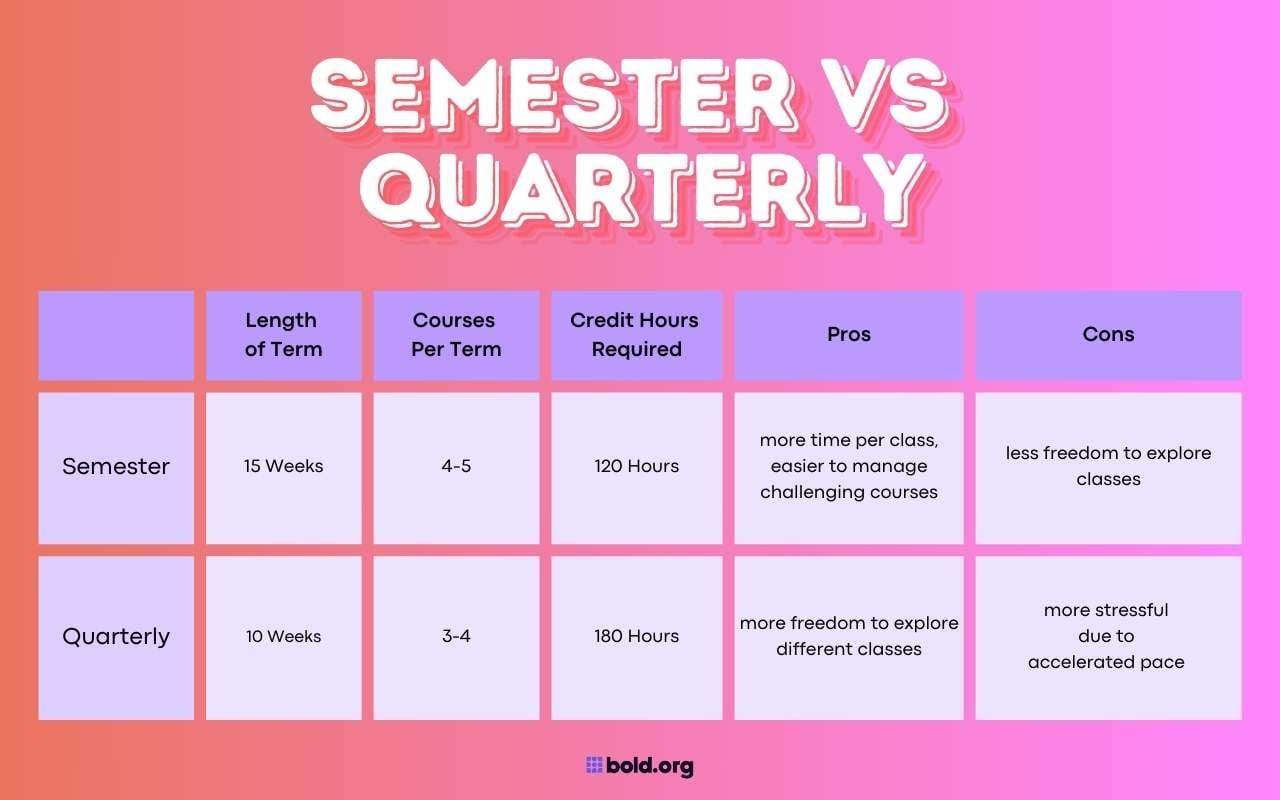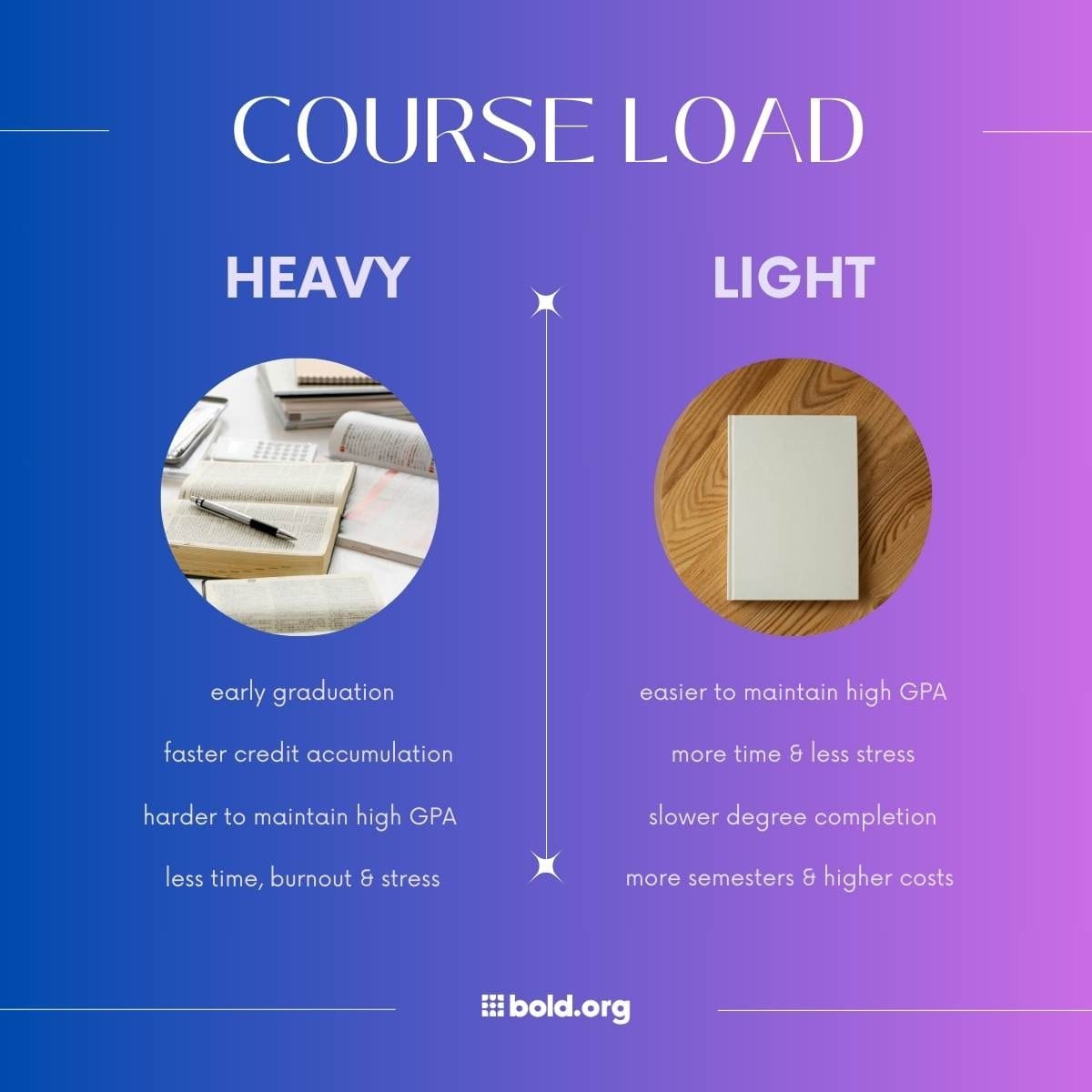How Many Classes per Semester in College in 2025?


As a college student, it is easy to be distracted by the exciting things that come with matriculating into school, but classes and college career aspirations are the most important aspects. To prepare for the shift in course load from high school, one of the most informed decisions you will need to make each semester is the number of courses you'll take.
With academic and personal factors to consider, it can be challenging to determine how many courses you should take. In this article, we explore the critical considerations when deciding how many classes to take each semester, including understanding semester requirements, minimum course load, degree expectations, course difficulty, and personal circumstances. Let's dive in.
No matter how many classes you think you'll take, you'll want to sign up for a free profile on Bold.org to start winning exclusive scholarships for your college education!
Get Matched to Thousands of Scholarships
Create your Bold.org profile to access thousands of exclusive scholarships, available only on Bold.org.
Create Free ProfileTypical Course Load
To put it simply, most students will take 4-5 classes every semester.
However, the number of classes you take is determined by how many credit hours you need to fulfill. One credit hour equates to approximately three hours of coursework per week, including lectures, assignments, readings, and exam preparations.
Most college courses are at least 3 credits, and most schools require 12-18 credits per semester for full-time status. This means you can take between 4-6 classes to be a full-time student earning a bachelor's degree. Sometimes, students will even take 2 or 3 classes a semester if they have already fulfilled the necessary credits in previous semesters.

Understanding College Semesters
When determining the optimal course load, it is also essential to understand how college semesters work. Colleges separate themselves depending on the schedule they offer college courses. Typically, colleges offer two semesters per year, lasting about 15 weeks each. However, some colleges follow a quarter system, with three ten-week terms each year.
Semester vs. Quarter System
When determining the amount of classes to take per semester, the type of academic schedule is critical to consider. Each schedule has its own restrictions when it comes to selecting courses.
- Semester System: The semester system provides more time to complete course requirements, which is helpful for managing challenging classes or other commitments.
- Quarter System: The quarter system's shorter terms demand more effort per course but offer a wider variety of classes, which is ideal for exploring different subjects or if you're undecided on a major.
For both systems, the summer semesters tend to be well-needed breaks from the school year but may also offer a period of academic catch-up for those who want to progress more rapidly through their higher education.
Pro Tip: Some students find the quarter system to be more stressful, as they have to adjust to a new set of classes and professors every ten weeks. It's also more difficult to catch up due to the accelerated pace.
Check out our blog on how long a college semester is for more information about semesters and quarters!

Factors Influencing Course Load
Every college student will have to choose a course load given their unique experiences and degree goals. An abundance of factors can influence your course load, including academic and personal factors. Let's take a closer look at some of these factors.
Full-Time vs. Part-Time Status
In order to obtain full-time student status, students are required to take at least 12 credit hours per semester, while a part-time student takes fewer hours. Part-time status is usually chosen by students who have other commitments, such as a job or family responsibilities.
Most colleges consider 15 credit hours as the threshold for a full course load, beyond which you may incur additional fees. While this is true for the average college student, it is always best to check with your college to understand their policies regarding full-time vs. part-time status.
Create Your Free Profile to Apply for Scholarships Today!Degree Requirements
One of the most critical factors that determine your course load is the requirements of your degree program. Each program has different requirements, and some may require more courses than others. You can go on to your respective institution's website and find your major or minor to find a comprehensive list of the classes needed to be completed.
Major and Minor Selection
Another factor that can influence your course load is your major or minor selection. If you are double majoring or adding a minor to your degree, you will be expected to take a lot more courses throughout your four years. Additionally, some majors or minors may require a more substantial amount of coursework per semester than others.
With our innovative scholarship search engine, you can find scholarships tailored to your majors and passions!

Electives and General Education Courses
Many colleges require students to take general education courses or electives in various fields of study that might be wildly different from their own. Unless exempt, these courses are mandatory to graduate. Fortunately, these classes are designed to provide a broad education and expose students to new areas of study.
Personal Commitments
College students have different personal circumstances, such as work, family, and extra-curricular activities, which may affect their time commitment to academic work. It's vital to evaluate your schedule thoroughly and ensure that you have enough time to study, complete assignments, and participate in academic and social activities.
Pro Tip: Don't be afraid to communicate with your professors, academic advisor or even other students if you need additional support or accommodations.
Academic and Financial Aid Policies
Finally, some colleges have academic or financial aid policies that require students to maintain a certain number of credit hours per semester or academic year. It's important to familiarize yourself with these policies and plan your course load accordingly. Before beginning freshman year, try to get familiar with the school's course requirements to plan your future years there.
Trying to find alternatives to federal student aid in order to fund your degree? At Bold.org, we've got you covered with these exclusive scholarships for undergrads!

Benefits of Taking More or Fewer Classes
The number of classes you take per semester affects your academic performance, personal life, and overall experience in college. It's essential to choose the right course load that balances your academic goals with your personal commitments and well-being.
Pros and Cons of a Heavy Course Load
A heavy course load can be beneficial for students who want to graduate early or make faster progress toward degree completion. However, it comes with its own set of challenges and drawbacks.
- Pros:
- Early graduation: By taking more classes per semester, you can complete your degree requirements earlier than your peers.
- Faster progress towards degree completion: A heavy course load can help you accumulate credits faster and move closer to graduation.
- Cons:
- Risk GPA: Taking too many classes can lead to a lower GPA due to the increased academic pressure and workload.
- Less time for extracurricular activities and social events: A heavy course load can leave you with little time for extracurricular activities, social events, and other commitments outside of academics.
- Burnout and stress: The heavy workload can lead to burnout and stress, which can negatively impact your academic performance and overall well-being.
Pros and Cons of a Light Course Load
On the other hand, taking a lighter course load can be beneficial for students who want to maintain a high GPA, have more time for extracurricular activities and personal commitments, and reduce stress and burnout. However, it also has some drawbacks.
- Pros:
- Higher GPA due to manageable workload: By taking fewer classes, you can manage your workload better and maintain a higher GPA.
- More time for extracurricular activities and personal commitments: A lighter course load can give you more time to pursue extracurricular activities, hobbies, and personal commitments.
- Less stress and burnout: A lighter workload can reduce stress and burnout, allowing you to focus on your academics and well-being.
- Cons:
- Slower progress towards degree completion: Taking fewer classes can slow down your progress towards degree completion and delay your graduation.
- Additional semesters and associated costs: Taking a lighter course load can lead to additional semesters and associated costs, such as tuition, fees, and living expenses.
Whether you're an undergrad or a PhD student, you don't want to miss these college survival tips for better time management and study habits!

Strategies for Choosing the Right Course Load
To determine the optimal course load per semester, here are some strategies that can help:
- Consult with your academic advisor or counselor to ensure that you are on track to graduate on time and meet your degree requirements.
- Assess your personal commitments, such as work, family, and extracurricular activities, and determine how much time you can realistically devote to academics.
- Consider your time management skills and ability to handle academic pressure and workload.
- Explore different course load options, such as taking summer classes or online courses, to balance your workload and progress toward degree completion.
By choosing the right course load, you can achieve your academic goals while maintaining a healthy balance between academics, personal commitments, and well-being.
Tips for Managing Your Course Load
Managing your course load requires effective planning, time management, and stress reduction strategies. Here are some tips to help you succeed:
Planning Your Schedule
- Use a planner or calendar to track deadlines and exam dates.
- Create and stick to a study schedule, prioritizing assignments by due date.
- Balance difficult and easy courses to maintain motivation.
- Avoid overscheduling; take on only what you can realistically handle.
Balancing Work, School, and Personal Life
- Take breaks and engage in activities you enjoy, like joining a club.
- Communicate your schedule with employers, friends, and family for support.
- Prioritize time for hobbies, exercise, and relaxation, as a healthy mindset boosts school performance.
Knowing When to Adjust Your Course Load
- Know the drop and add deadlines. Dropping a course before the deadline removes it from your transcript.
- After the drop deadline, you can withdraw from a course for a "W" on your transcript, which won't affect your GPA.
- Monitor your academic performance and seek help early if you're struggling.
Another way you can take the classes you want without overwhelming yourself is by auditing a course. Find out all about auditing a college class in this comprehensive blog!

Frequently Asked Questions About How Many Classes Per Semester in College
Can I take more than the recommended number of classes?
Yes, you can take more courses than the recommended course load. Most schools will allow students to take one extra course or 3 credits higher than the recommended amount. With this in mind, you still need to ensure that you don't overwork yourself and have enough time to complete all your assignments and study. You may also need to pay additional fees if you take more than the threshold credit hours per semester.
How do I know if I'm taking too many classes?
The effects of taking too many classes might look different for everybody, but it may show itself by severe burnout, sleeplessness, and stress. In extreme cases, it might cause poor academic performance, missed deadlines, or struggle to keep up with your coursework. It's essential to monitor your course load and seek help if you notice any of these symptoms.
What if I need to drop a class?
In order to drop a class, you need to follow your college's protocol for dropping and adding college classes. Typically, this involves submitting a formal request before the drop deadline and filling out the appropriate forms. Before dropping a class, make sure it doesn't affect your academic progress or eligibility for financial aid.
Hop on over to our scholarship blog for more answers to your deepest college anxieties, written for students by students!